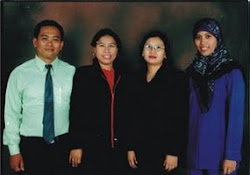Schizophrenia is a severe form of psychosis with main symptoms is the split personality that characterized the function of the soul that is not harmonious.
Aetiology of schizophrenia somatogenesis approach, one of which is genetic factors (offspring). Various studies have shown that the gene is inherited one, very strong influence one's risk of having schizophrenia. Research on families, twins and adopted children tend to show that vulnerability to schizophrenia is transmitted genetically. The more closely a person with schizophrenic patients, the greater the risk for these diseases. Research on families involving twins and adopted children have attempted to identify the genetic causes of schizophrenia. It was found that identical twins raised separately have a high incidence of schizophrenia than the sibling pairs are not identical. Last genetic research focusing on 'gene mapping' (mapping genes in families where there are a number of high incidence of schizophrenia.
Images obtained from the study as follows:
- study of the family mentioned in the elderly 5.6%, 10.1% siblings, children 12.8%, and the population as a whole 0.9%
- studies of twins (twin) mentioned in 59.20% identical, whereas fraternal twins 15.2%.
Other research states that interference with fetal brain development also has a role for the emergence of schizophrenia later in life. These disturbances arise such as malnutrition, infection, trauma, toxins, and hormonal disorders. Recent research says that despite the abnormal gene, schizophrenia does not appear unless accompanied by epigenetic factors. The conclusion is that schizophrenia appears when there is interaction between the abnormal gene by:
- viruses or other infections during pregnancy can interfere with fetal brain development
- decline that may result from autoimmune infection during pregnancy
- complications of pregnancy
- malnutrition is quite severe, particularly in the trimester of pregnancy
Further stated that people who already have these epigenetic factors when experiencing psychosocial stressor in their life will experience a greater risk to suffer from schizophrenia than those who had no previous epigenetic factors.
Research Brother Twins and siblings The Only One Suffering Schizophrenia
| % Who suffer from schizophrenia | |
| Monozigot twins (one egg) Heterozygous twins (two eggs) Siblings Stepsister Public | 86.2% 14.5% 14.2% 7.1% 0.85% |
(Sumber : JC Coleman, 1970. Abnormal Psychology and Modern Life . Bombay : Tarapovela Sons & co. Halaman 121) (Source: JC Coleman, 1970. Abnormal Psychology and Modern Life. Bombay: Tarapovela Sons & co. Page 121)
Source :
Iman, S. 2006. Skizofrenia : Memahami Dinamika Keluarga Pasien. Bandung : Refika Aditama.
Sunaryo. 2005. Psikologi Untuk Keperawatan. Bandung : EGC.
Yosep, I. 2009. Keperawatan Jiwa. Bandung : Refika Aditama.




